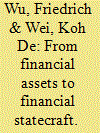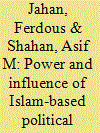| Srl | Item |
| 1 |
ID:
133809


|
|
|
|
|
| Publication |
2014.
|
| Summary/Abstract |
Over the past few decades, China has accumulated over US$3.4 trillion of official foreign exchange reserves as it rises to become a global power. Do China's financial assets increase its ability to pursue its national interests internationally? With the globalisation and rising influence of Chinese state-owned enterprises, state-owned banks and sovereign wealth fund, as well as China's growing clout in several regional groupings, it is clear that China does possess the necessary mechanisms to assert its financial power. This article examines the efficacy and limitations of these mechanisms in Africa and Latin America, in the economic and political domains. In the economic domain, China has consistently used foreign oil contracts and acquisitions to secure direct oil flow from developing nations. An analysis of recent cases shows that while China is able to successfully harness its financial power in its pursuit of oil, it needs to fulfil its promises to the satisfaction of the recipient countries in order to maintain the value of its offers. In the political domain, China has used its financial assets to purchase diplomatic allegiance from various African and Latin American countries in support of its One-China policy. Studying both successful and unsuccessful cases reveals that while China is generally able to use its financial power in third-world countries against Taiwan successfully, its national goals have, in recent years, shifted to the economic realm, even with countries that still recognise the Taipei government.
|
|
|
|
|
|
|
|
|
|
|
|
|
|
|
|
| 2 |
ID:
133722


|
|
|
|
|
| Publication |
2014.
|
| Summary/Abstract |
Bangladesh has received scholarly attention about the extent and nature of Islamism in the political domain. We argue that, to analyze the significance of religion in the political process, it is essential to consider the role of religion in both influencing the policy and electoral outcome. Based on an in-depth qualitative study during the most recent election of 2008, we review previous elections results and the policy influence of religion-based parties; we argue that, in Bangladesh, Islamic parties' policy influence is very high and electoral success is very low. A deeply entrenched civil religion in the form of nationalistic identity bars religion from playing a significant role in influencing the voting behavior of the citizens. The mainstream political parties have so far failed to recognize the significance of this civil religion.
|
|
|
|
|
|
|
|
|
|
|
|
|
|
|
|